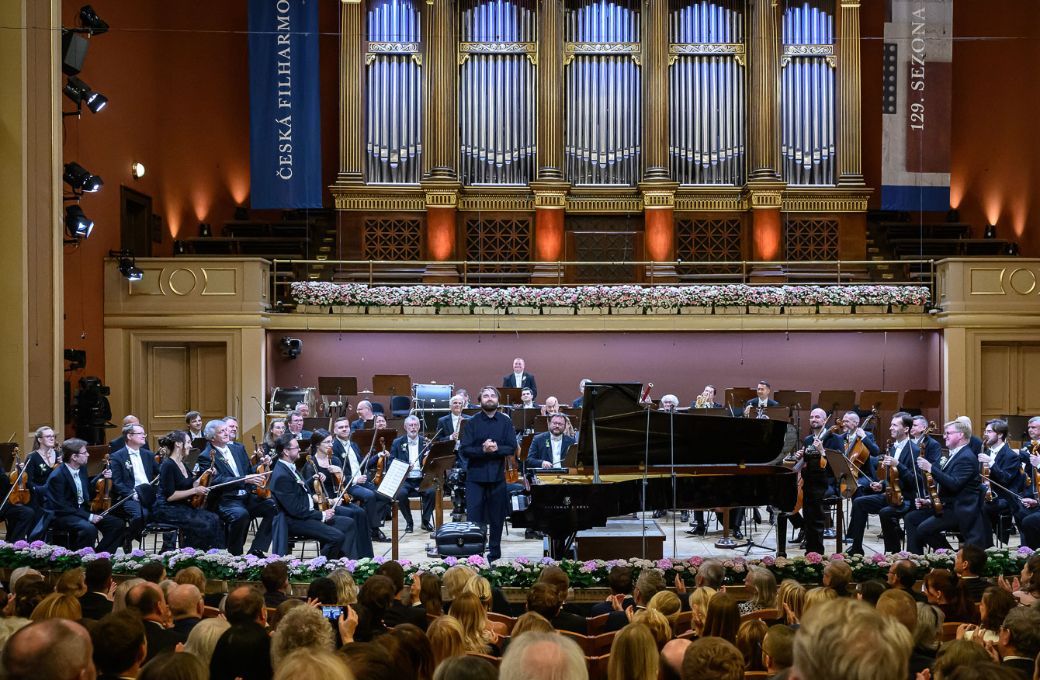It was not a typical opening concert for the Czech Philharmonic, but a better kickoff to the new season would be hard to imagine. With Chief Conductor Semyon Bychkov sidelined by back surgery, veteran Charles Dutoit filled in to lead a program of Dvořák’s Piano Concerto in G minor and Berlioz’s Symphonie fantastique. Daniil Trifonov set the tone for his artistic residency this season with a commanding rendition of the concerto, and Dutoit handled the symphony with the alacrity and insight of a consummate professional.

Dvořák’s Piano Concerto is distinctive for its integration of soloist and orchestra, and in that respect Trifonov was an ideal choice, with a dominant voice that fits neatly into a large ensemble. He was all business taking the stage, barely acknowledging the audience before turning a laser focus on the keyboard that never broke. Trifonov attacked the music, firing off blazing runs that ended with his fingers snapping off the keys. In the few solo piano passages, the combination of his intensity and fluidity was mesmerizing. And his technique was beyond dazzling, a virtuoso display of both speed and precision.
For all that, his style didn’t quite fit the material. It was cold to start, then overheated, almost florid at times, rather than radiating the emotional warmth characteristic of Dvořák. Whether this works is largely a matter of taste, and in the second movement Trifonov showed impressive range, dropping notes as soft as raindrops. If his treatment wasn’t exactly what Czech audiences are used to hearing, it was nonetheless well-informed and gripping, a harbinger of what should be a revelatory residency.
Dutoit also offered a different take on Dvořák, up tempo with a brighter, more transparent sound than the orchestra usually offers. That made the contrasts particularly strong, with sharp hammer blows of emphasis framing gentle, lighter-than-air textures. And throughout, he used the woodwinds like painterly details, adding color and sparkle to the sound.
The Symphonie fantastique offered an opportunity to show what an accomplished conductor can do, which in Dutoit’s hands was remarkable. Working without a score, he crafted the overlapping layers of music like a sculptor, building from gossamer openings to dramatic soundscapes without any loss of transparency. The music felt alive and temperamental, organically unfolding into elegant melodies, animated outbursts and delicately woven interludes. The third movement, a pastoral scene cut short by thunder, was positively enchanting in its evocation of bucolic tranquility.
And if Berlioz squeezed as much as possible out of every single instrument in the orchestra, Dutoit did the same. Whispering strings in the first movement, a bubbling effect in the waltz of the second, shocking tones in the fourth and high-flying blasts of brass in the finale highlighted a nimble performance that included an occasional grunt, roll of thunder and vivid burst of color. The woodwinds once again stood out, particularly oboist Vladislav Borovka, who spun out beguiling solo lines throughout the third movement.
On the podium, this was all accomplished with economy and efficiency. Dutoit is not given to histrionics – befitting an artist of 87, though more to the point, a deeply experienced maestro with a specialty in French music who knows how to get what he wants out of an orchestra. And in this case, what he got was very good.


